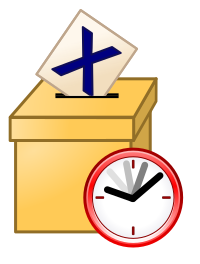.jpg) |
| Image source: The Greens |
Showing posts with label politics. Show all posts
Showing posts with label politics. Show all posts
February 8, 2012
The Australian Greens 2008-2011
November 1, 2011
A Handbook for the 43rd Parliament

The Parliamentary Library recently published the 2011 edition of the Parliamentary Handbook. The Handbook is a comprehensive guide to the 43rd Parliament. The biographical section includes details of the parliamentary service and political career of each Senator and Member, as well as some personal particulars. The Handbook also provides statistics on the age, length of service, qualifications and previous occupations of the current Parliament, together with data on the 2010 elections as well as a map of federal electoral divisions. Valuable lists and tables concerning the history of the Australian Parliament are provided, such as lists of Governors-General, Presiding Officers, Prime Ministers, Leaders of the Opposition, Ministers, Shadow Ministers and all Senators and Members since 1901. The Handbook also includes a copy of the Constitution, and detailed information on all referendums and plebiscites.
The Handbook can be used as a source document for questions such as:
Where can I get a list of Prime Ministers since 1901, with their terms of office?
Where can I find biographical information on MPs?
Who is the longest serving MP?
How many women MPs have there been since 1901?
Which MPs were born overseas?
Where can I find information on electorates?
What was the composition of the Senate in 1996?
When is the latest possible date for the next election?
How many referendums have been successful?
Full text of the Parliamentary Handbook can be accessed online, and hard copies can also be ordered from the Parliament Shop at $70 each.
July 18, 2011
Pre-selecting candidates using US-style ‘primaries’
 |
| Image source: Parliamentary Education Office |
At its recent State Conference the NSW Branch of the ALP decided to trial US-style primaries for preselections. Primaries are candidate preselection processes that tend to involve more people than just, say, party delegates, officials or financial members of parties. The NSW trial process—in five electorates—would give members of the community a 50 per cent say in the selection of the candidates.
June 30, 2011
A quick guide to plebiscites in Australia
 When Opposition Leader Tony Abbott proposed a plebiscite to test Australians’ support for a carbon tax, the proposal was variously described in the media as ‘junk politics’, a ‘stunt’, a ‘serious misjudgement’ and ‘an expensive, bad idea’. But what exactly is a plebiscite?
When Opposition Leader Tony Abbott proposed a plebiscite to test Australians’ support for a carbon tax, the proposal was variously described in the media as ‘junk politics’, a ‘stunt’, a ‘serious misjudgement’ and ‘an expensive, bad idea’. But what exactly is a plebiscite?April 15, 2011
Time in Government since Federation
On Monday 28 March 2011 Barry O’Farrell was sworn in as Premier of New South Wales thus ending the Labor Party’s 16-year period in office. The Liberal/National Coalition’s win in NSW brings to three the current number of non-Labor governments in Australia’s nine federal, state and territory jurisdictions (Western Australia, Victoria and New South Wales).
This is the first time since Federation that these three states have been under Coalition control while Labor is in power in the other six jurisdictions. It is quite the norm for there to be a mix of Labor and non-Labor jurisdictions. There have been only six periods when all federal and state governments were of the same political persuasion with non-Labor predominating.
This is the first time since Federation that these three states have been under Coalition control while Labor is in power in the other six jurisdictions. It is quite the norm for there to be a mix of Labor and non-Labor jurisdictions. There have been only six periods when all federal and state governments were of the same political persuasion with non-Labor predominating.
August 26, 2010
Early election
The House of Representatives that is emerging from the 2010 election, and the fact that the next government will be a minority government, raises the spectre of the electorate going to the polls well before the next federal election would otherwise be expected. If an election takes place prior to mid-2013 it will only be for the House of Representatives and the territory senators; the rest of the Senate will not be in play unless there is a double dissolution.
July 21, 2010
Federal election announced
On Saturday, 17 July 2010, the Prime Minister Julia Gillard announced that a federal election would be held on Saturday, 21 August 2010. The 42nd Parliament was prorogued and the House of Representatives dissolved at 5.00pm on Monday, 19 July 2010. Key dates for the 2010 federal election are:
- Announcement: Saturday, 17 July 2010
- Issue of writ: Monday, 19 July 2010
- Deadline to enrol to vote: 8pm Monday, 19 July 2010
- Deadline to update your electoral roll details (Close of rolls): 8pm Thursday, 22 July 2010
- Close of nominations: 12 noon Thursday, 29 July 2010
- Declaration of nominations: 12 noon Friday, 30 July 2010
- Issue of writ: Monday, 19 July 2010
- Deadline to enrol to vote: 8pm Monday, 19 July 2010
- Deadline to update your electoral roll details (Close of rolls): 8pm Thursday, 22 July 2010
- Close of nominations: 12 noon Thursday, 29 July 2010
- Declaration of nominations: 12 noon Friday, 30 July 2010
Subscribe to:
Posts (Atom)


